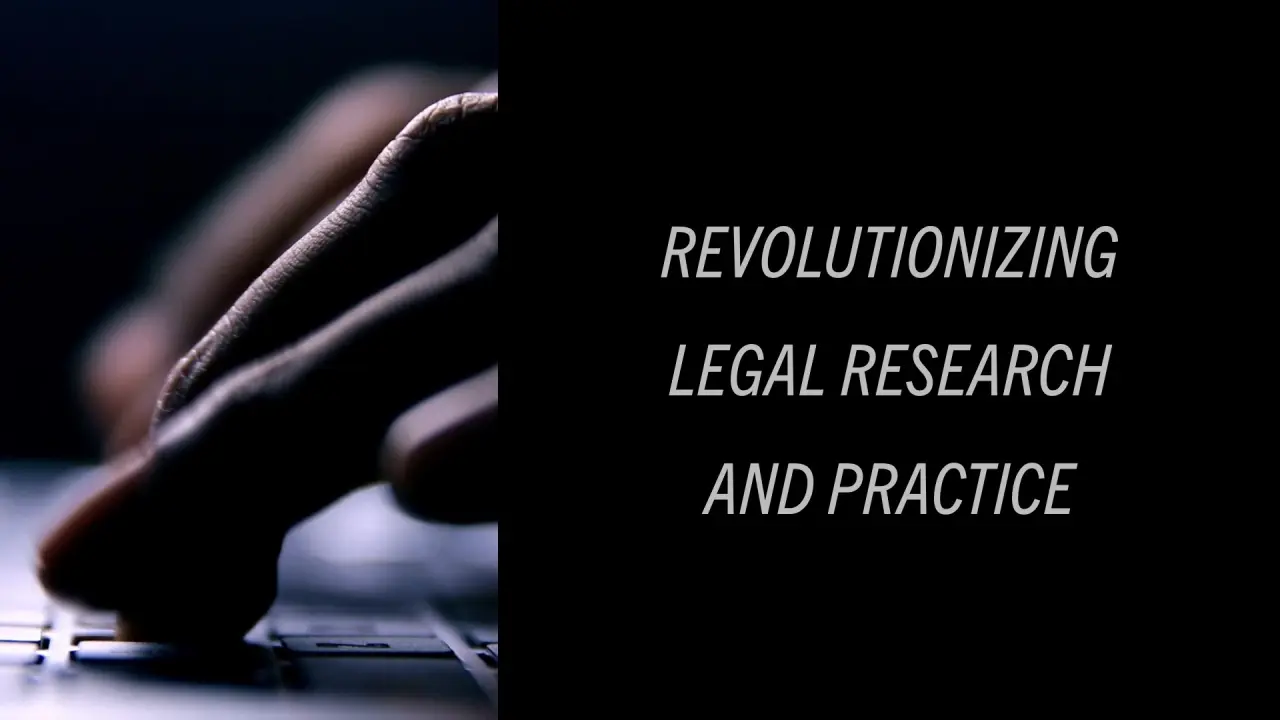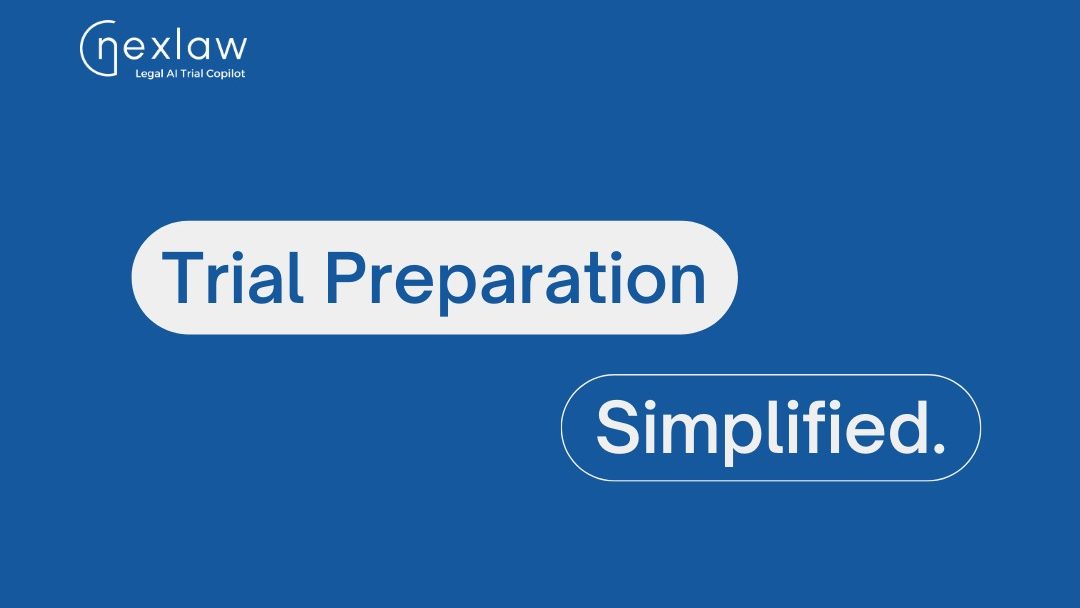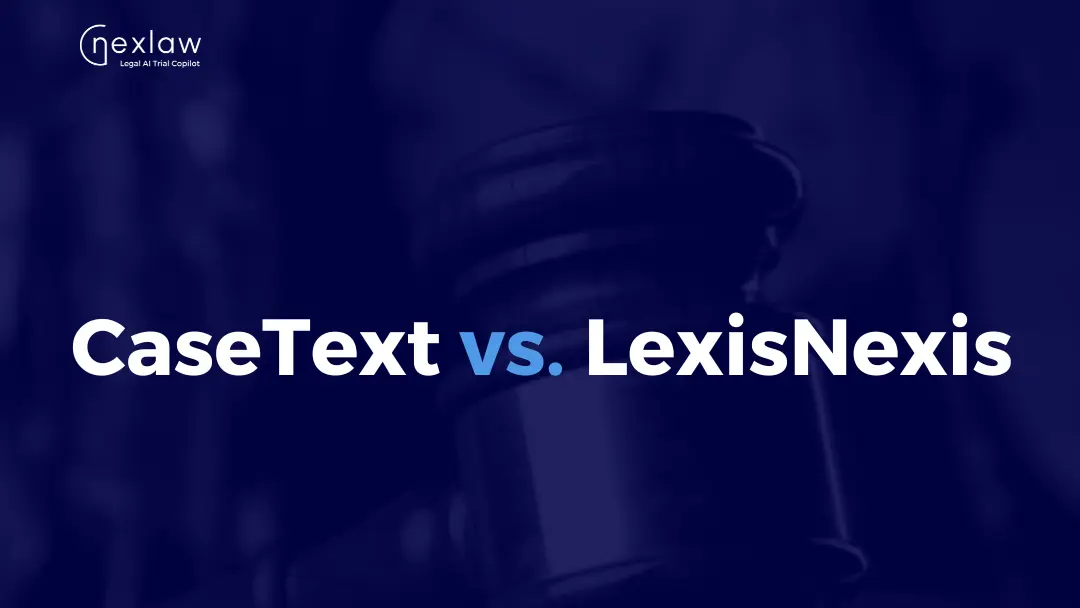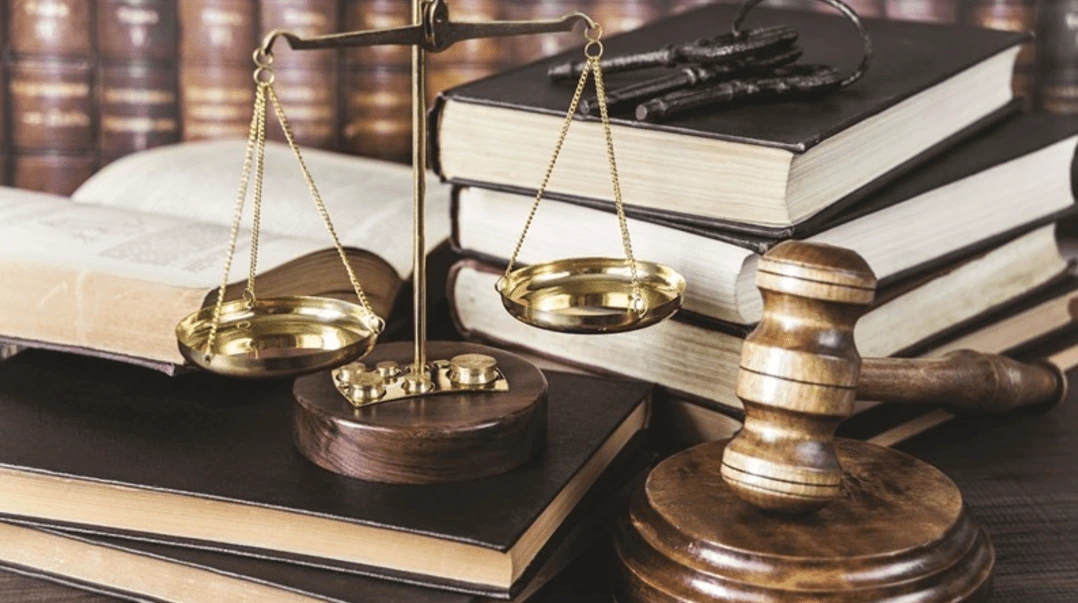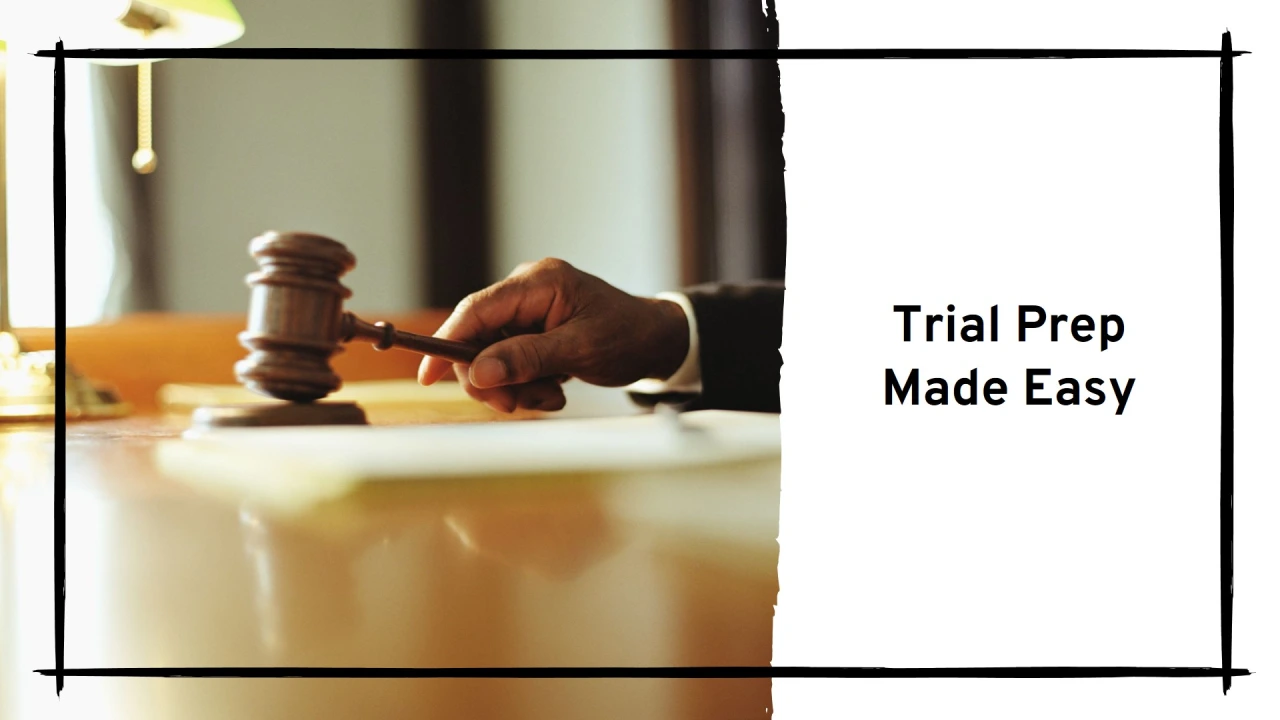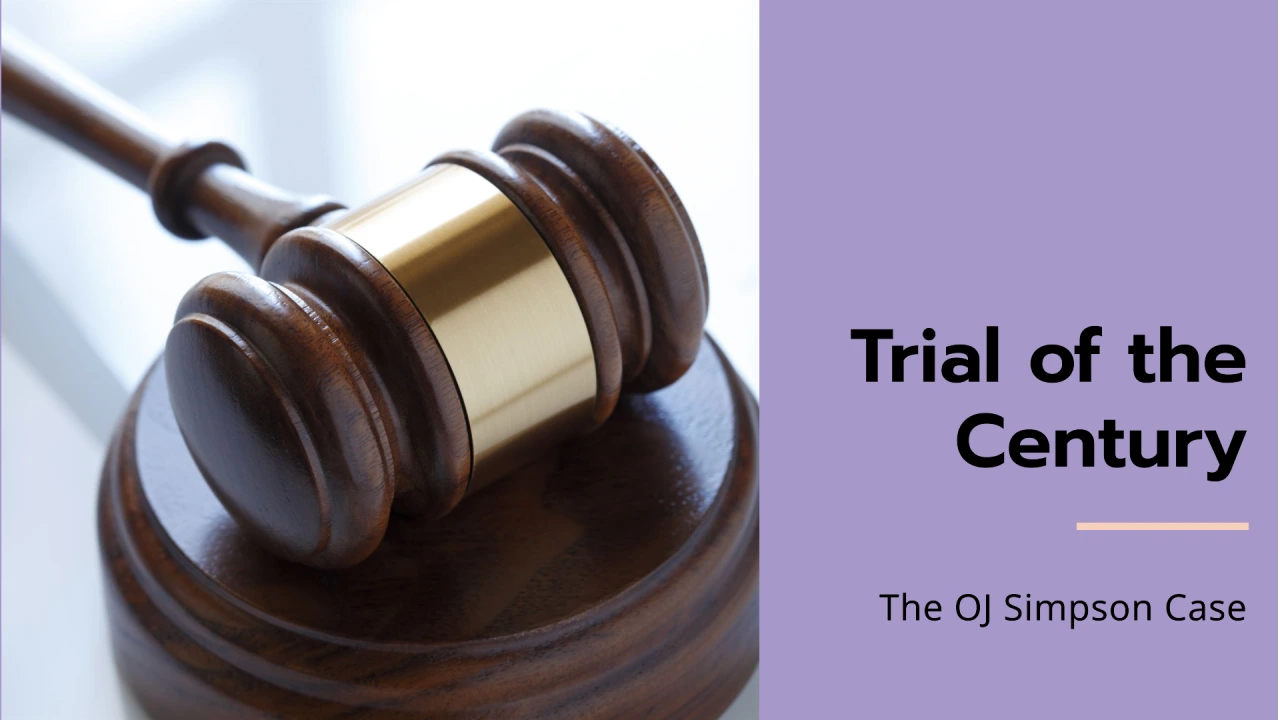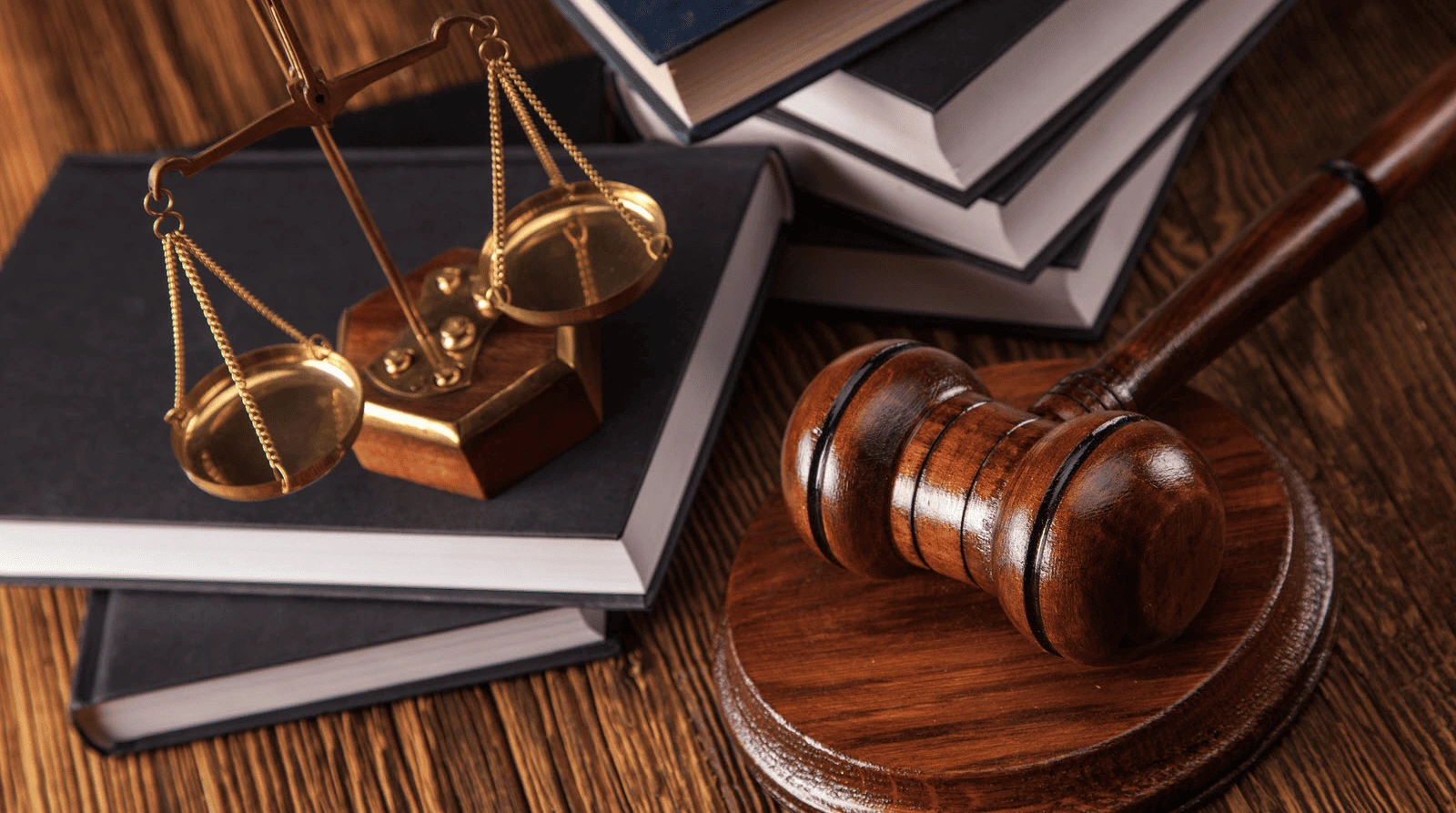Trial Preparation
Comprehensive Guide
The Ultimate Guide to Trial Preparation
The Essence of Trial Preparation
The true art of trial preparation involves a deep dive into both the strategic and minutiae aspects of your case. It requires lawyers to master the art of ‘zooming out’ to see the big picture and ‘zooming in’ to handle the critical details. Whether you’re dealing with wrongful death, personal injury, or any other case, this dual focus is crucial.
Materials needed for trial preparation:
- Evidence, depositions, and requests for admission
- Pre-trial briefs and motions
- Jury instructions to present at the trial’s start
- An opening statement outlining your case
- Direct testimony from your witnesses, including experts
- Witnesses prepared for cross-examination
- Motions for summary judgment or directed verdict
- Cross-examination plans for opposing witnesses
- Post-testimony motions to the court
- Closing arguments
- An appeal record, if needed
Thorough trial preparation is essential for a successful outcome. By meticulously organizing and managing materials, you set the stage for a compelling and well-structured presentation. Attention to these details not only ensures a smoother trial process but also enhances your ability to effectively advocate for your client.
Trial preparation is a collaborative effort that involves a range of key participants, each contributing their specialized skills to build a robust case.
- Attorneys: Formulate legal strategies, prepare and file motions, and represent the case in court.
- Paralegals: Manage documents, organize evidence, and coordinate logistical details.
- Witnesses: Deliver testimony that bolsters the case.
- Experts: Provide expert insights to clarify technical elements of the case.
Successful trial preparation hinges on the seamless coordination of these roles, ensuring that every aspect of the case is thoroughly addressed and effectively presented in court.
Paralegals are essential to trial preparation, handling tasks from organizing documents and evidence to managing logistics and deadlines. Their contributions ensure a streamlined process and effective trial strategy.
Document Management: Paralegals maintain organized, accessible legal documents for quick retrieval during the trial.
Evidence Handling: They manage and catalog all evidence while preserving its integrity and chain of custody.
Court Filings and Deadlines: Paralegals track court filing deadlines, ensuring timely submissions and task accountability.
Witness Management: They identify key witnesses, conduct interviews, and prepare detailed reports to assist in witness examination.
Scheduling and Logistics: Paralegals coordinate witness schedules, transportation, and accommodations to ensure readiness for trial.
Witness Preparation: They help witnesses prepare for testimony through briefings, mock sessions, and role-playing exercises.
Attorney Support: Paralegals conduct legal research, organize case law, and assist in trial rehearsals and courtroom setup to support the attorney’s strategy.
Paralegals support ensures an organized and efficient trial process, contributing significantly to the case’s success. The efficiency and productivity of their routine can be increased by accelerating legal AI tools that can help paralegals with their workloads.
In the final month leading up to trial, the client plays a crucial yet distinct role. While not involved in the day-to-day preparation, the client’s contributions are vital:
Guidance and Settlement Discussions: The client is key in guiding settlement talks and defining the desired outcome. Expect frequent, in-depth discussions about case details and witness information.
Testimony Preparation: If taking the stand, the client must prepare thoroughly. Typically, this involves about an hour of prep for every ten minutes of testimony, including direct and cross-examination practice.
Witness and Cross-Examination Prep: The client often has valuable connections and insights into witnesses. Assisting in locating and preparing witnesses and strategizing cross-examinations can save significant time and money.
Expert Collaboration: Working closely with experts is essential, as clients often provide critical business insights that experts may lack.
Evaluating Jury Impact: The client’s perspective on how case themes and statements will resonate with the jury can be invaluable. Regular feedback from the client can refine presentation strategies.
Document and Evidence Handling: The client should help locate and organize critical documents and encourage staff to cooperate.
Monitoring Business Changes: Keep the legal team informed of any business developments that might affect damage or settlement.
Detailed Interactions: Be prepared to clarify detailed subject matter questions as preparation progresses.
The client’s role in the final thirty days is pivotal in shaping the trial’s outcome. Their involvement in settlement discussions, testimony preparation, witness management, and expert collaboration ensures a well-rounded and strategic approach to the trial.
A trial outline organizes the entire trial process, ensuring a clear and compelling case presentation.
Opening Statements
An effective opening statement sets the trial’s tone, summarizing the case and establishing a resonant theme. Reviewing past examples can provide inspiration.
Key Evidence
Organize evidence by type (documentary, physical, digital, testimonial) and relevance.
Witness Lists
Create a detailed witness list and manage contacts to track roles, link facts, and compile related documents for effective testimony and cross-examination.
Closing Arguments
Close by reinforcing your case’s strengths, addressing weaknesses, and connecting key evidence and testimony back to the opening statement.
This approach not only enhances your case presentation but also ensures you are prepared for any challenges that may arise. With a clear timeline, you can navigate the complexities of the trial process with confidence, leading to a more effective and compelling argument.
Preparing for a trial is a complex and demanding process that requires meticulous planning, organization, and teamwork. Whether you are an attorney or a paralegal, following these top 10 tips can help ensure that your trial preparation is efficient and effective, ultimately leading to a successful outcome in court.
1. Create a Detailed Timeline
Establish a timeline that outlines all critical tasks leading up to the trial. Start this process at least three months in advance, breaking down tasks by weeks. Include deadlines for filing motions, preparing witness lists, and finalizing exhibits. This structured approach helps ensure that nothing is overlooked and that all preparations are completed on time.
2. Organize Exhibits Thoroughly
Exhibits are crucial in presenting your case. Organize all trial exhibits—documents, photographs, and physical evidence—into easily accessible binders or digital folders. Label each exhibit clearly and ensure that you have multiple copies for the court, witnesses, and your team. Familiarize yourself with courtroom technology to avoid technical glitches during the trial.
3. Prepare Witnesses Effectively
Witness preparation is essential for a successful trial. Identify key witnesses early and conduct thorough interviews to understand their perspectives. Provide them with clear guidance on what to expect during their testimony, including courtroom procedures and the types of questions they may face. Conduct mock examinations to help them practice their responses.
NexLaw can significantly enhance this process with its AI-driven witness analysis feature. The platform assesses the strengths and weaknesses of each witness, providing insights into their reliability and potential vulnerabilities. Features like deposition support report offers a comprehensive set of questions tailored to the witness’s background and the specifics of the case, ensuring your team is fully prepared for every aspect of the testimony.
4. Draft Comprehensive Legal Documents
Prepare all necessary legal documents well in advance, including trial briefs, jury instructions, and opening and closing statements. NexLaw can significantly streamline the preparation of trial documents like these, even the final brief for submission. Ensure that these documents are clear, concise, and persuasive. Having these materials ready allows you to focus on strategy and presentation as the trial date approaches.
5. Utilize Technology for Collaboration
Leverage technology to enhance communication and collaboration among your team. Use cloud-based platforms to share documents, track changes, and manage deadlines. This ensures that everyone is on the same page and can access the most up-to-date information, reducing the risk of miscommunication. Not only that, but to perform your best in court, you might want to consider reliable legal tech for your firm. What is legal tech?
6. Conduct Mock Trials
Mock trials are an excellent way to prepare for the actual courtroom experience. Organize practice sessions where your team can simulate the trial environment. This helps identify potential weaknesses in your case, refine witness testimonies, and improve overall presentation skills.
7. Establish Clear Communication Channels
Effective communication is vital during trial preparation. Set up regular check-ins with your team to discuss progress, address concerns, and make necessary adjustments to your strategy. Ensure that everyone understands their roles and responsibilities, fostering a collaborative environment.
8. Review and Revise Your Strategy
As the trial date approaches, continuously review and refine your strategy. Stay flexible and be prepared to adapt to new information or developments in the case. Regularly reassess your arguments and evidence to ensure they align with your overall case theme.
9. Prepare for the Unexpected
Trials can be unpredictable, so it’s essential to be prepared for unforeseen challenges. Anticipate potential objections from opposing counsel and develop responses. Have contingency plans in place for issues such as witness unavailability or last-minute evidence changes.
10. Take Care of Your Well-Being
Trial preparation can be stressful, so prioritize self-care during this demanding time. Ensure that you and your team are managing stress effectively, getting enough rest, and maintaining a healthy work-life balance. A clear mind and well-rested body are crucial for optimal performance in the courtroom.
Thoughts on these tips?
Efficient and effective trial preparation is fundamental to achieving a successful outcome in court. By following these top 10 tips, legal professionals can navigate the complexities of trial preparation with confidence, ensuring that they are well-prepared to advocate for their clients. With careful planning, organization, and teamwork, you can enhance your trial readiness and increase your chances of success in the courtroom.


How does AI help in Trial Prep ?
Securely upload your case files
and the system will analyze your
input based on specific
jurisdictions





How does AI help in Trial Prep ?
Get advanced analytics and predictive reports tailored to your
case, such as key elements, case strategy, judge analysis, and etc
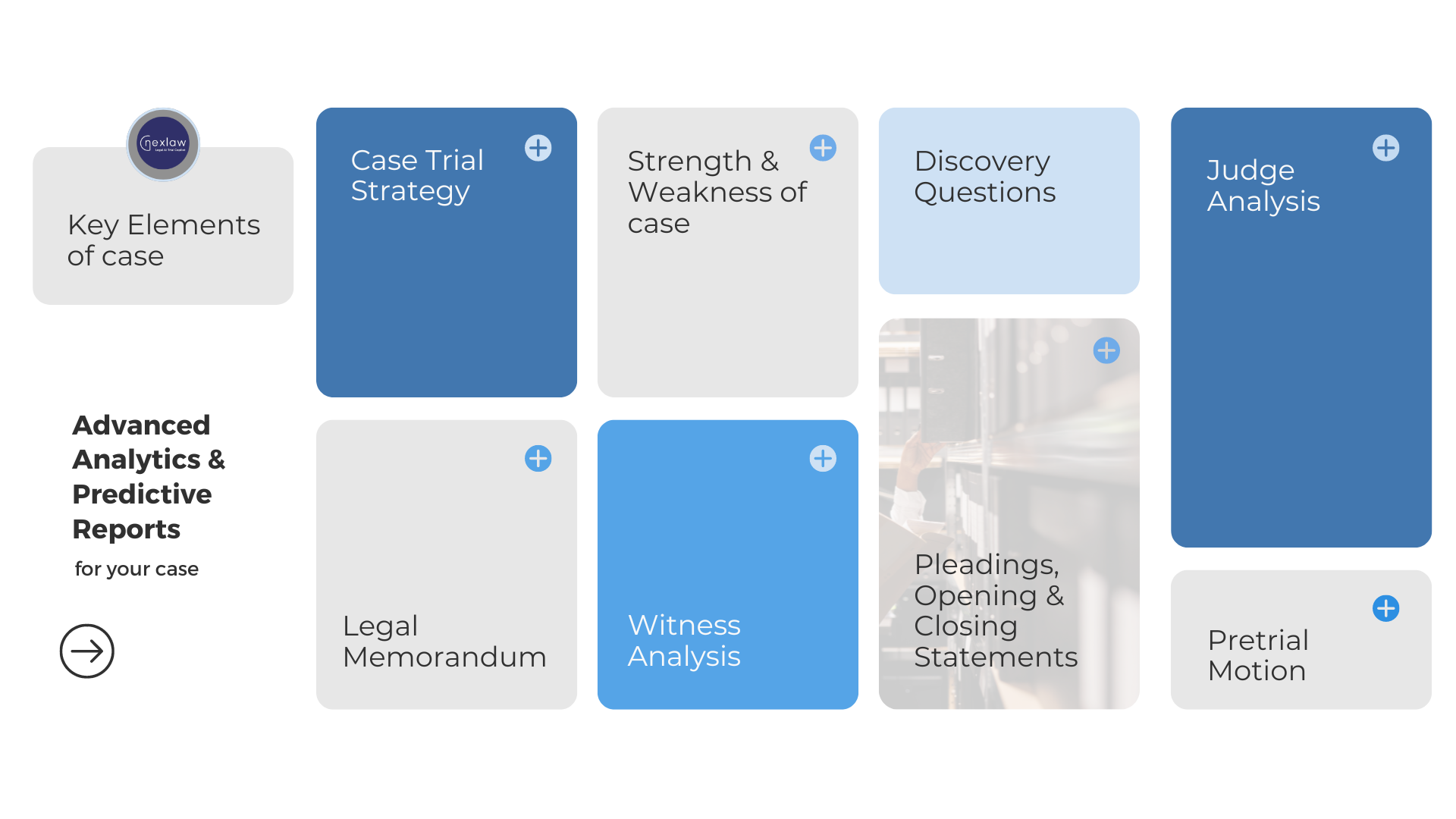
How does AI help in Trial Prep ?
Upload new evidence during the trial for
instant analysis and updated insights

How does AI help in Trial Prep ?
Get instant answers to
any questions regarding your case
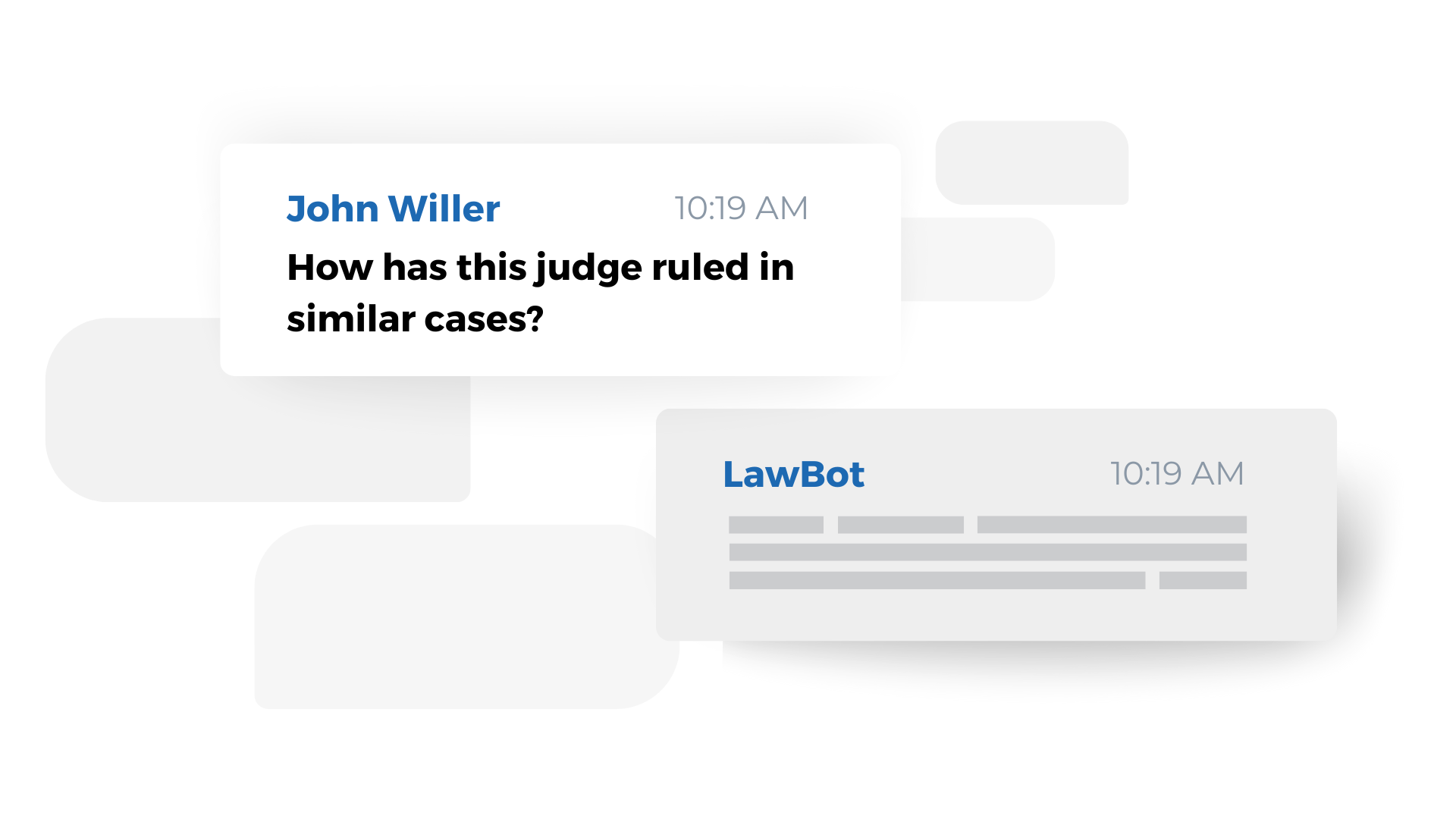
How does AI help in Trial Prep ?
Receive a comprehensive final brief ready
for submission at the end of the trial
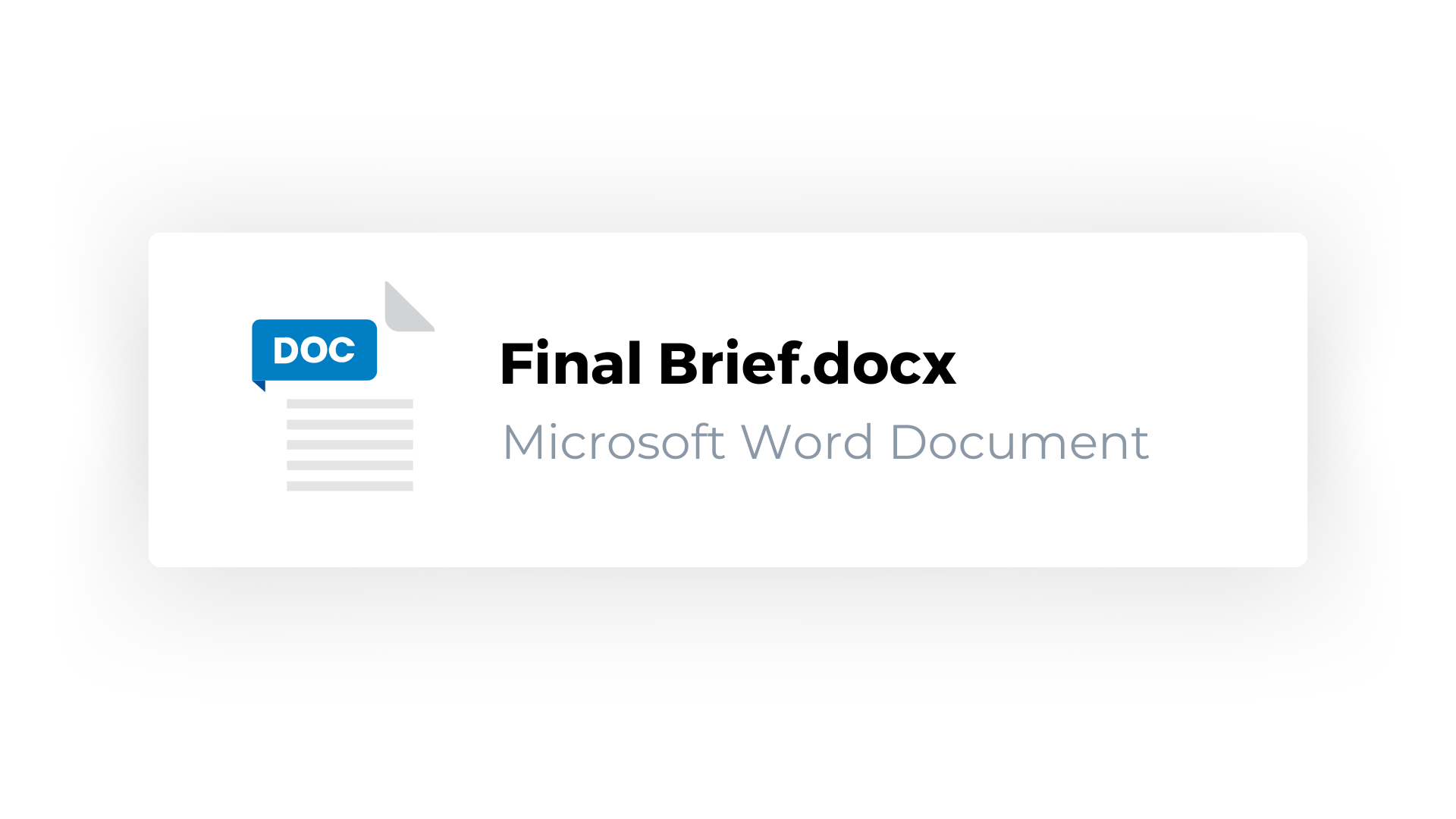

Legal AI Trial Copilot for dispute litigation analytics and trial strategy
NexLaw streamlines your entire litigation process
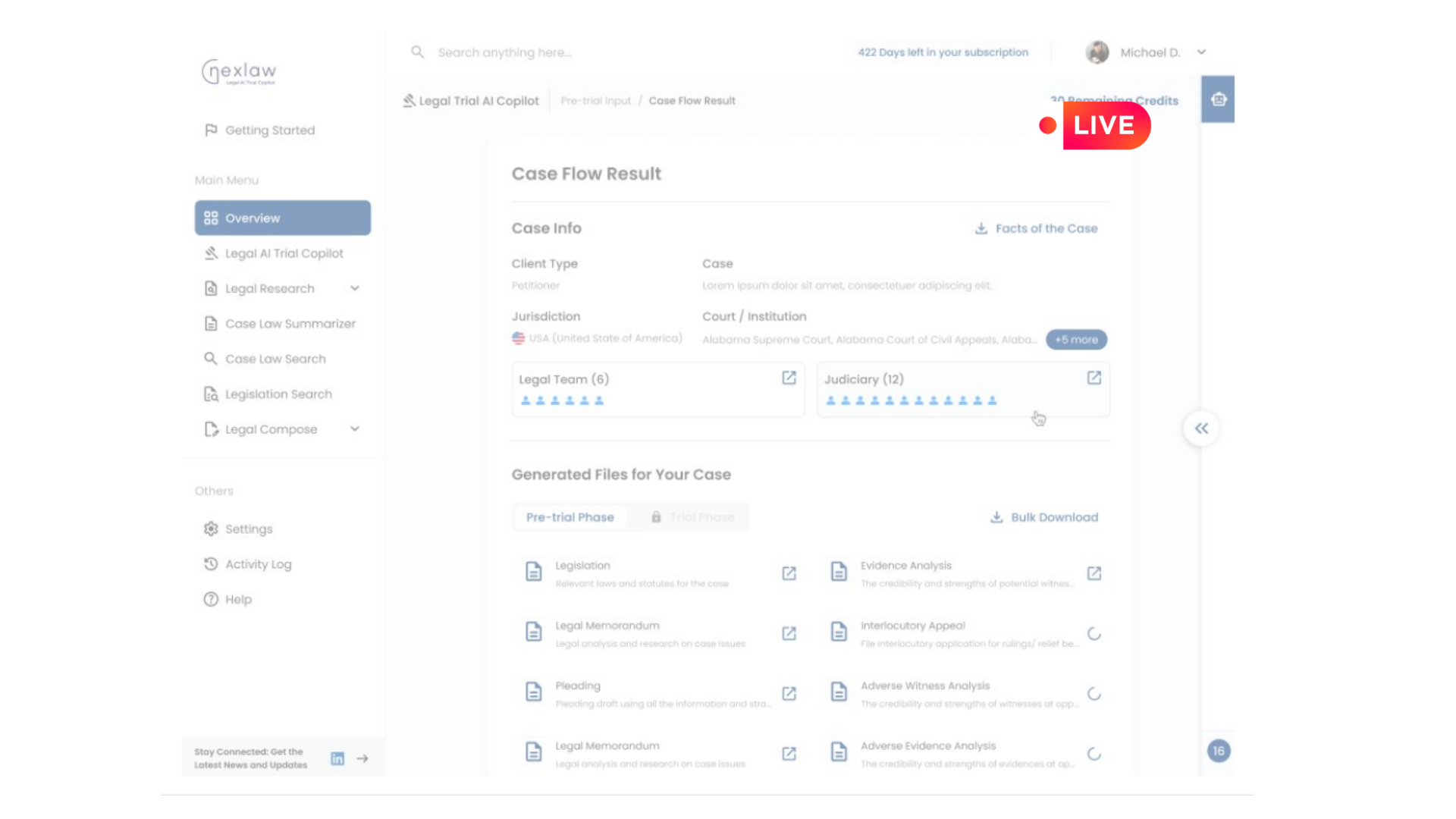
Book a Live Demo
with Us Now
Trial Preparation Checklist: Key Tasks Before Trial
Three Months Before Trial:
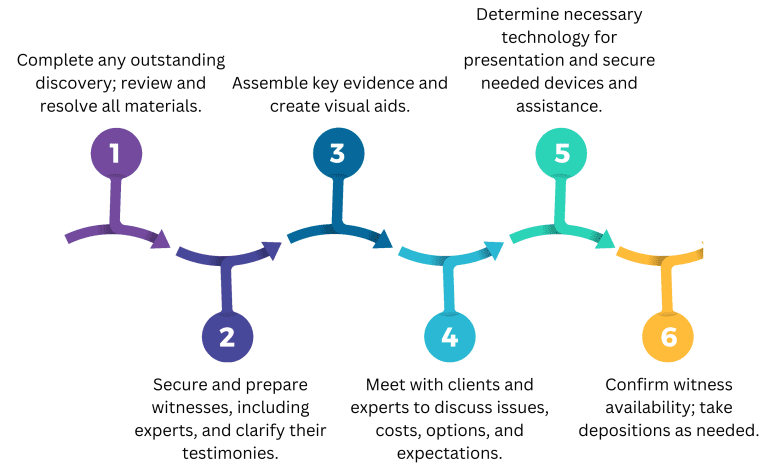
Graphic 1: The activities in the three months before the trial
Two Months Before Trial:
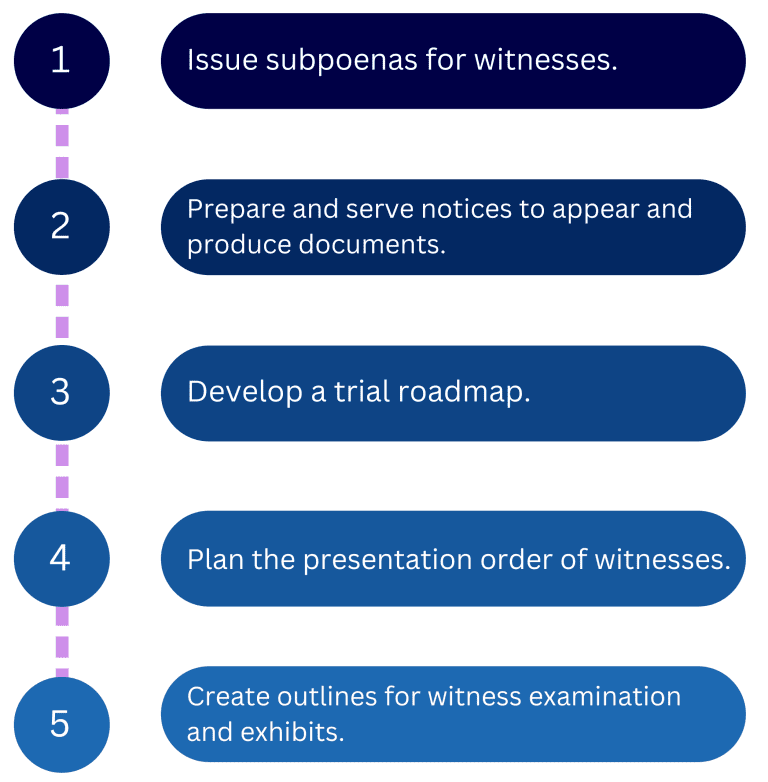
Graphic 2: The activities in the two months before the trial
One Month Before Trial:
Meet with clients to prepare them for testimony and review their past responses.
Ready witness depositions or statements for use at trial.
Finalize elements supporting the trial narrative.
Prepare all witnesses and keep them informed about scheduling.
Draft the trial brief, opening and closing statements, and jury instructions.
Prepare questions for witnesses and organize exhibits for their testimony.
Write briefs on identified legal issues.
Graphic 3: The activities in the one month before the trial
Thorough and timely preparation is essential for a successful trial. By systematically addressing tasks and milestones leading up to the trial, you ensure that every aspect is well organized, allowing for a smoother and more effective presentation in court.

Get ahead of the curve with our free Guide to Starting Using Legal AI!
Trial Preparation Challenges You Might Encounter
- Managing a large volume of materials and coordinating team efforts.
- Ensuring effective communication among team members.
- Overcoming remote work challenges and managing digital casework.
- Sifting through vast amounts of information to identify key facts.
- Efficiently reviewing and integrating deposition materials.
Overcoming these trial preparation challenges requires careful organization, clear communication, and effective management of both physical and digital resources. Addressing these issues proactively can significantly enhance the efficiency and success of your trial preparation.
See NexLaw in Action
Start your free trial and kick off your legal AI journey with a personalized demo
*By submitting the form, you agree to the Terms of Service and Privacy Policy
You Might Want to Consider These Add-Ons for Trial Preparation
Courtroom Technology
To avoid technical issues, always bring your own equipment. Court-provided tech can be unreliable, so having your own mobile setup ensures you’re prepared. Many firm uses a 55-inch TV with wireless HDMI and backup equipment to stay self-sufficient.
Voir Dire
Different courts have varied voir dire practices. Observing the judge’s methods in advance helps tailor your approach, including general questions, juror challenges, and seating arrangements.
Law To Have on Hand
Be ready for unexpected legal issues. Bring printed copies of relevant cases and legal citations to handle surprises efficiently. Organize these materials for quick distribution if needed.
Big victories in court require attention to detail. Like building a mansion, trial success depends on meticulous preparation and hard work behind the scenes.
Top 10 Tips for Efficient and Effective Trial Preparation
Preparing for a trial is a complex and demanding process that requires meticulous planning, organization, and teamwork. Whether you are an attorney or a paralegal, following these top 10 tips can help ensure that your trial preparation is efficient and effective, ultimately leading to a successful outcome in court.
1. Create a Detailed Timeline
Establish a timeline that outlines all critical tasks leading up to the trial. Start this process at least three months in advance, breaking down tasks by weeks. Include deadlines for filing motions, preparing witness lists, and finalizing exhibits. This structured approach helps ensure that nothing is overlooked and that all preparations are completed on time.
2. Organize Exhibits Thoroughly
Exhibits are crucial in presenting your case. Organize all trial exhibits—documents, photographs, and physical evidence—into easily accessible binders or digital folders. Label each exhibit clearly and ensure that you have multiple copies for the court, witnesses, and your team. Familiarize yourself with courtroom technology to avoid technical glitches during the trial.
3. Prepare Witnesses Effectively
Witness preparation is essential for a successful trial. Identify key witnesses early and conduct thorough interviews to understand their perspectives. Provide them with clear guidance on what to expect during their testimony, including courtroom procedures and the types of questions they may face. Conduct mock examinations to help them practice their responses.
NexLaw can significantly enhance this process with its AI-driven witness analysis feature. The platform assesses the strengths and weaknesses of each witness, providing insights into their reliability and potential vulnerabilities. Features like deposition support report offers a comprehensive set of questions tailored to the witness’s background and the specifics of the case, ensuring your team is fully prepared for every aspect of the testimony.
4. Draft Comprehensive Legal Documents
Prepare all necessary legal documents well in advance, including trial briefs, jury instructions, and opening and closing statements. NexLaw can significantly streamline the preparation of trial documents like these, even the final brief for submission. Ensure that these documents are clear, concise, and persuasive. Having these materials ready allows you to focus on strategy and presentation as the trial date approaches.
5. Utilize Technology for Collaboration
Leverage technology to enhance communication and collaboration among your team. Use cloud-based platforms to share documents, track changes, and manage deadlines. This ensures that everyone is on the same page and can access the most up-to-date information, reducing the risk of miscommunication. Not only that, but to perform your best in court, you might want to consider reliable legal tech for your firm. What is legal tech?
6. Conduct Mock Trials
Mock trials are an excellent way to prepare for the actual courtroom experience. Organize practice sessions where your team can simulate the trial environment. This helps identify potential weaknesses in your case, refine witness testimonies, and improve overall presentation skills.
7. Establish Clear Communication Channels
Effective communication is vital during trial preparation. Set up regular check-ins with your team to discuss progress, address concerns, and make necessary adjustments to your strategy. Ensure that everyone understands their roles and responsibilities, fostering a collaborative environment.
8. Review and Revise Your Strategy
As the trial date approaches, continuously review and refine your strategy. Stay flexible and be prepared to adapt to new information or developments in the case. Regularly reassess your arguments and evidence to ensure they align with your overall case theme.
9. Prepare for the Unexpected
Trials can be unpredictable, so it’s essential to be prepared for unforeseen challenges. Anticipate potential objections from opposing counsel and develop responses. Have contingency plans in place for issues such as witness unavailability or last-minute evidence changes.
10. Take Care of Your Well-Being
Trial preparation can be stressful, so prioritize self-care during this demanding time. Ensure that you and your team are managing stress effectively, getting enough rest, and maintaining a healthy work-life balance. A clear mind and well-rested body are crucial for optimal performance in the courtroom.
Thoughts on these tips?
Efficient and effective trial preparation is fundamental to achieving a successful outcome in court. By following these top 10 tips, legal professionals can navigate the complexities of trial preparation with confidence, ensuring that they are well-prepared to advocate for their clients. With careful planning, organization, and teamwork, you can enhance your trial readiness and increase your chances of success in the courtroom.
Mental Preparation for Trial
Returning to routine work after a high-stakes trial can feel anticlimactic. The intense stress and focus during the trial often make everyday tasks seem trivial, requiring a week to regain perspective.
Trials are among the most exhausting and engrossing experiences, akin to survival situations where every detail matters. A trial attorney often works nights to prepare for the next day’s challenges, with the reality that strategies and tactics must adapt constantly.
A trial is frequently decided by the ongoing effort and adjustment during the proceedings. As one military saying puts it: “No battle plan survives contact with the enemy.”
Therefore, mental preparation before and during the trial is crucial. Clients should prioritize the trial over personal matters, dedicating time and energy to participate actively and assisting the legal team. Adequate sleep and exercise are essential. As one client wisely noted, “This is the big game, and I am in training.”
Streamline your trial preparation with NexLaw Legal AI Trial Copilot!
Preparing for a trial can be overwhelming, but with NexLaw’s Legal AI Trial Copilot, you can simplify and accelerate the process. Our technology is designed to enhance every aspect of AI trial preparation, ensuring you stay organized and focused.
Here’s Legal AI Trial Copilot can transform your trial prep:
Instant Litigation Analytics: Our AI delivers real-time insights and strategies tailored to each case, significantly reducing the time spent on research and analysis.
Comprehensive Trial Strategy Development: From initial research to post-trial submissions, our tool assists in every phase of trial preparation, ensuring that legal professionals can focus on delivering the best outcomes for their clients.
Time and Cost Efficiency: Our technology can save hundreds of hours in trial prep work, allowing lawyers to manage their caseloads more effectively and reduce stress associated with overwhelming paperwork.
NexLaw, a leading legal AI company, introduces the Legal AI Trial Copilot — your ultimate partner in trial preparation. Discover how it can transform your approach, book a live demo today.
Final Thoughts
Meticulous trial preparation is the cornerstone of courtroom success. A comprehensive approach, combining strategic planning with detailed attention to logistics and evidence management, ensures that every aspect of your case is robustly addressed. Collaborating effectively with paralegals, leveraging the client’s unique insights, and utilizing advanced legal AI tools like NexLaw can further streamline and enhance the preparation process. By integrating these practices, legal professionals can navigate the complexities of trial preparation with confidence, ultimately leading to a more compelling and well-organized presentation in court.
Related Articles










